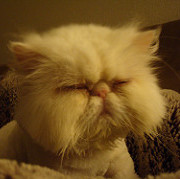|
Home
|
Oct 24, 2016
This week’s themeWords formed by dialectal pronunciation This week’s words ornery passel sassy tarnal raiment 
Photo: Gorilla esq.
A.Word.A.Day
with Anu GargCould thru, a phonetic respelling of the word through, become standard and replace the original some day? It’s possible. But don’t start girding your loins to defend the purity and honor of the English language. It has happened many times. Let me rephrase that: It happens all the time, though the rate of change is slowing down. Like a flowing river, language often takes the path of least resistance. Language is a spoken thing. In the beginning, few people knew how to read or write. As long as you could understand what word was meant, spelling didn’t matter. Just take any word, say spelling. We have at least four forms of the word attested: spellynge, spellyng, Spelling, and spelling -- there are likely many other possibilities. Printing and literacy resulted in the spelling becoming standardized, but we still respell, shorten, and mold words as it suits us. For example, the word donut has replaced doughnut, at least in the US. This week we’ll see five words that have had their spellings altered over time based on pronunciation, sometimes resulting in a new word with a new sense. ornery
PRONUNCIATION:
MEANING:
adjective: Having an unpleasant disposition: irritable, stubborn, combative, etc.
ETYMOLOGY:
An alteration of the word ordinary, from Latin ordo (order, rank). In the
beginning the word ornery was just a dialect pronunciation of the word
ordinary and meant the same. Over time it acquired negative senses, from
commonplace to lazy to mean to cantankerous. Earliest documented use: 1692.
USAGE:
“DI John Rebus is an ornery and often difficult detective who is
frequently at odds with his young assistant and his supervisors.” Tom Budlong; Video; Library Journal (New York); Oct 15, 2016. See more usage examples of ornery in Vocabulary.com’s dictionary. A THOUGHT FOR TODAY:
I have no riches but my thoughts, yet these are wealth enough for me.
-Sarah Teasdale, poet (1884-1933)
|
|
Subscriber Services
Awards | Stats | Links | Privacy Policy
Contribute | Advertise
Awards | Stats | Links | Privacy Policy
Contribute | Advertise
© 1994-2026 Wordsmith